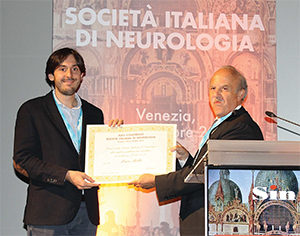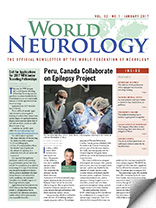By Bruno Giometto

The Past President of Italian Neurological Society, Prof. Quattrone (right) presents an award to Dr. Luca Bello for his paper “DMD Genotypes and Loss of Ambulation in the CIRNG Duchenne Natural History Study,” published in Neurology.
This year, the Italian neurological community gathered in Venice for the XLVII Congress of the Italian Society of Neurology (SIN). Over 1,500 delegates took part in four days of intense updating divided into three plenary sessions, 10 refresher courses, and 21 workshops, in addition to teaching conferences and sponsored symposia. Venice has always been a leader in the treatment of diseases of the nervous system, and the appeal of the illustrious city has given the national neurological community added visibility in scientific, care provision, and educational terms.
At the inaugural ceremony, held at the Cinema Palace in Venice, 10 young researchers were awarded for first authorship in high-impact medical journals, while Dr. Luigi Bertinato gave a very interesting keynote lecture on “Controlling the Plague in the Serenissima Republic of Venice and Its Relevance to the Present Day.” He described how the public health system actually started in Venice in 1500 when, to curb the spread of the plague, which was decimating the city’s population, the first quarantine station was set up to isolate the sick, and ships arriving from the East (the Silk Route) were subject to rigorous control. (Read Dr. Bertinato’s speech.)
In the following days, all neurological conditions were covered, focusing on the most innovative aspects of the field and on translation into clinical practice. Special emphasis was paid to recently available therapeutic resources and care pathways, with a view to modifying the development of many neurological diseases.
More than 1 million Italians suffer from dementia, 600,000 of whom have Alzheimer’s disease. Every year, 120,000 Italians are affected by stroke, and 930,000 manifest residual disability related to the pathology. Finally, 90,000 patients have multiple sclerosis, 200,000 have Parkinson’s disease, and 500,000 are affected by epilepsy. In Italy, there has been a significant increase in the elderly population, implying a heavy burden in terms of care for age-related pathologies.
Particular attention was devoted to identifying the most appropriate models for neurological patient care at both the hospital and outpatient levels. Neurological diseases require highly specialized expertise and a multidisciplinary approach to management of the most advanced stages of the diseases. •
Bruno Giometto, MD, is the director of the Second Clinic of the Department of Neurology in Padova and a member of the Board of Arbitrators of the Italian Society of Neurology.
Main Topics at the XLVII Congress of the Italian Society of Neurology
- Headache
- Dementia and Aging
- Movement Disorders
- Pain
- Epilepsy
- Cerebrovascular diseases
- Degenerative diseases
- Motor Neuron diseases
- Neuromuscular diseases
- Neuroepidemiology
- Clinical Neurophysiology
- Clinical Neurophysiology and Sleep
- Neurogenetics
- Neuroimaging
- Neuroimunology
- Neuroinfectious diseases
- Clinical Neuropsychology
- Basic Neuroscience
- Neuro-Oncology
- Neurotraumatology
- Neurological Rehabilitation
- Multiple Sclerosis
- Sleep
- History of Neurology
